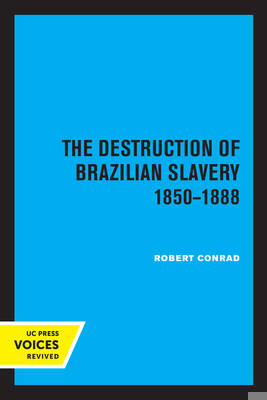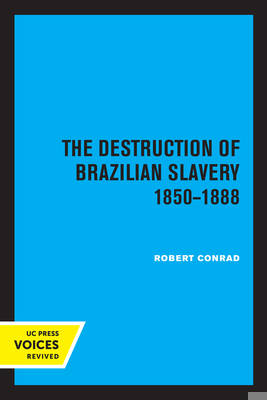
Door een staking bij bpost kan je online bestelling op dit moment iets langer onderweg zijn dan voorzien. Dringend iets nodig? Onze winkels ontvangen jou met open armen!
- Afhalen na 1 uur in een winkel met voorraad
- Gratis thuislevering in België vanaf € 30
- Ruim aanbod met 7 miljoen producten
Door een staking bij bpost kan je online bestelling op dit moment iets langer onderweg zijn dan voorzien. Dringend iets nodig? Onze winkels ontvangen jou met open armen!
- Afhalen na 1 uur in een winkel met voorraad
- Gratis thuislevering in België vanaf € 30
- Ruim aanbod met 7 miljoen producten
Zoeken
€ 84,95
+ 169 punten
Uitvoering
Omschrijving
The Destruction of Brazilian Slavery (1850-1888) offers a compelling exploration of how one of the world's most entrenched systems of forced labor unraveled over the course of decades. Through meticulous research, the book examines the interplay of economic pressures, international influence, and abolitionist efforts that led to the gradual decline of slavery in Brazil, culminating in its abolition in 1888. Authoritatively written, it delves into the regional disparities that shaped attitudes toward slavery, the critical role of the coffee-producing regions, and the pivotal impact of laws like the 1871 Law of the Free Womb. Readers gain a deep understanding of how external pressures, such as British diplomatic campaigns, and internal shifts in economic necessity eroded slavery's dominance in Brazilian society. This insightful study not only charts the collapse of slavery but also captures the broader socio-political changes of the time. With vivid storytelling, it highlights key figures like Joaquim Nabuco and Castro Alves, whose abolitionist advocacy helped galvanize the movement for freedom. Beyond liberation, the book examines the unfulfilled hopes for national reforms that would address education, political representation, and landholding inequalities. By combining narrative history with sharp analysis, The Destruction of Brazilian Slavery is an essential read for those interested in the complexities of abolition and the ongoing legacy of slavery in shaping modern societies. This title is part of UC Press's Voices Revived program, which commemorates University of California Press's mission to seek out and cultivate the brightest minds and give them voice, reach, and impact. Drawing on a backlist dating to 1893, Voices Revived makes high-quality, peer-reviewed scholarship accessible once again using print-on-demand technology. This title was originally published in 1972.
Specificaties
Betrokkenen
- Auteur(s):
- Uitgeverij:
Inhoud
- Aantal bladzijden:
- 376
- Taal:
- Engels
Eigenschappen
- Productcode (EAN):
- 9780520308190
- Verschijningsdatum:
- 13/05/2022
- Uitvoering:
- Paperback
- Formaat:
- Trade paperback (VS)
- Afmetingen:
- 152 mm x 229 mm
- Gewicht:
- 553 g

Alleen bij Standaard Boekhandel
+ 169 punten op je klantenkaart van Standaard Boekhandel
Beoordelingen
We publiceren alleen reviews die voldoen aan de voorwaarden voor reviews. Bekijk onze voorwaarden voor reviews.











